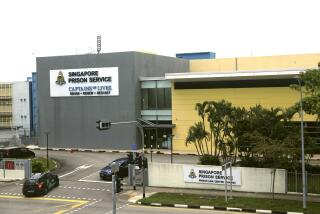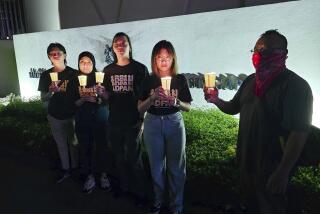Australia hints at tourism boycott if Indonesia executes two citizens
- Share via
Indonesian officials on Friday rebuffed pleas from the Australian government and a top United Nations human rights official to call off the imminent executions of two Australians convicted of attempted drug smuggling a decade ago.
The pleas for mercy were punctuated in the Australian city of Canberra with a veiled warning from Foreign Minister Julie Bishop that the executions planned before the end of this month could inspire a citizen boycott of Bali, a favorite vacation destination for Australians.
“I think the Australian people will demonstrate their deep disapproval of this action, including by making decisions about where they wish to holiday,” Bishop told Fairfax radio after making an impassioned appeal for reprieve for the two men.
Andrew Chan and Myuran Sukumaran were convicted and sentenced to death for their roles as ring leaders in a 2005 attempt to smuggle 8 kilograms, or 17.6 pounds, of heroin out of the country after a visit to Bali.
The Jakarta government on Friday authorized the transfer of Chan and Sukumaran from Kerobokan prison to the execution venue at the Central Java prison island of Nusakambangan, Sky News Australia reported.
Michael Kirby, a former justice on Australia’s supreme court, joined Bishop in warning of potential damage to relations between the Indian Ocean neighbors.
“This was not Indonesian drug dealing, it was Australian drug dealing -- these were Australians who are getting on to an Australian plane to bring them back to Australia with Indonesian drugs,” Kirby said of the Bali Nine case. Seven others involved in the crime remain imprisoned with long terms but do not face the death penalty.
Indonesian Foreign Ministry spokesman Arrmanatha Nasir brushed off the implied threat of a boycott of Indonesian resorts and reiterated the government’s position that drug smuggling is a major crime deserving of the ultimate penalty, Sky News reported.
The U.N. special envoy on extrajudicial executions, Christof Heyns, appealed to the Indonesian government to commute the death sentences of the two Australians and six other foreign nationals scheduled to go before firing squads by the end of this month.
Indonesia executed six other drug-crimes convicts -- five of them foreigners -- on Jan. 18, spurring international outrage among human rights advocates and officials of the executed men’s home countries, which included the Netherlands, Brazil, Vietnam, Malawi and Nigeria.
“Under international law, the death penalty is regarded as an extreme form of punishment which, if it is used at all, should only be imposed for the most serious crimes, that is, those involving intentional killing, and only after a fair trial, among other safeguards,” Heyns said in a statement from the U.N. Human Rights Council offices in Geneva.
The deprivation of the foreign defendants’ right to legal representation during their Indonesian trials rendered the death penalty sentences “tantamount to an arbitrary execution,” Heyns said.
There has been no public announcement of when the Australians are to be executed but the authorization of their transfer raised concerns that they could be moved to the Central Java death row as soon as this weekend. Families of the condemned men were told they would be given 72 hours notice ahead of the executions, Australia’s Guardian newspaper reported.
Follow @cjwilliamslat for the latest international news 24/7
More to Read
Sign up for Essential California
The most important California stories and recommendations in your inbox every morning.
You may occasionally receive promotional content from the Los Angeles Times.














